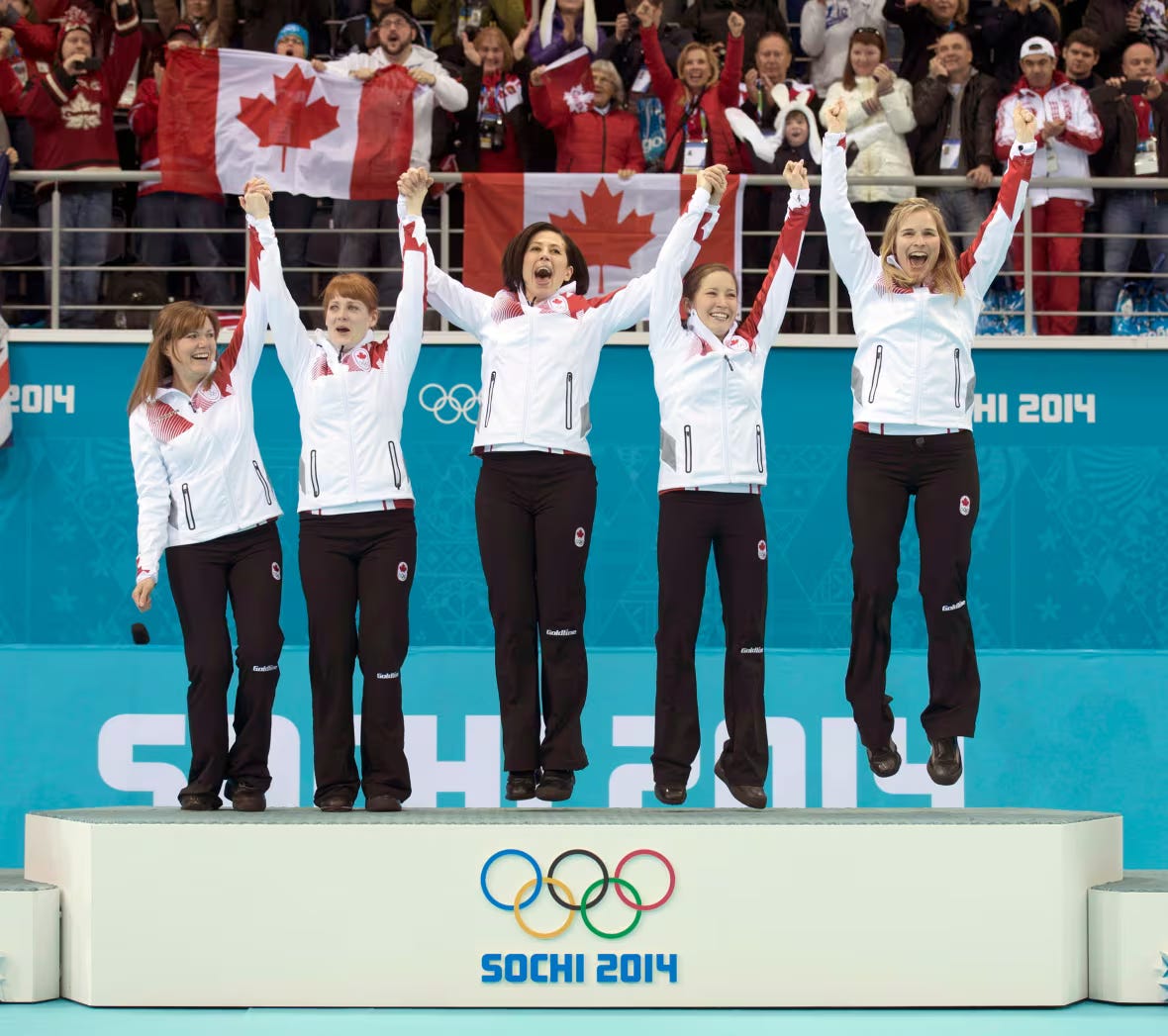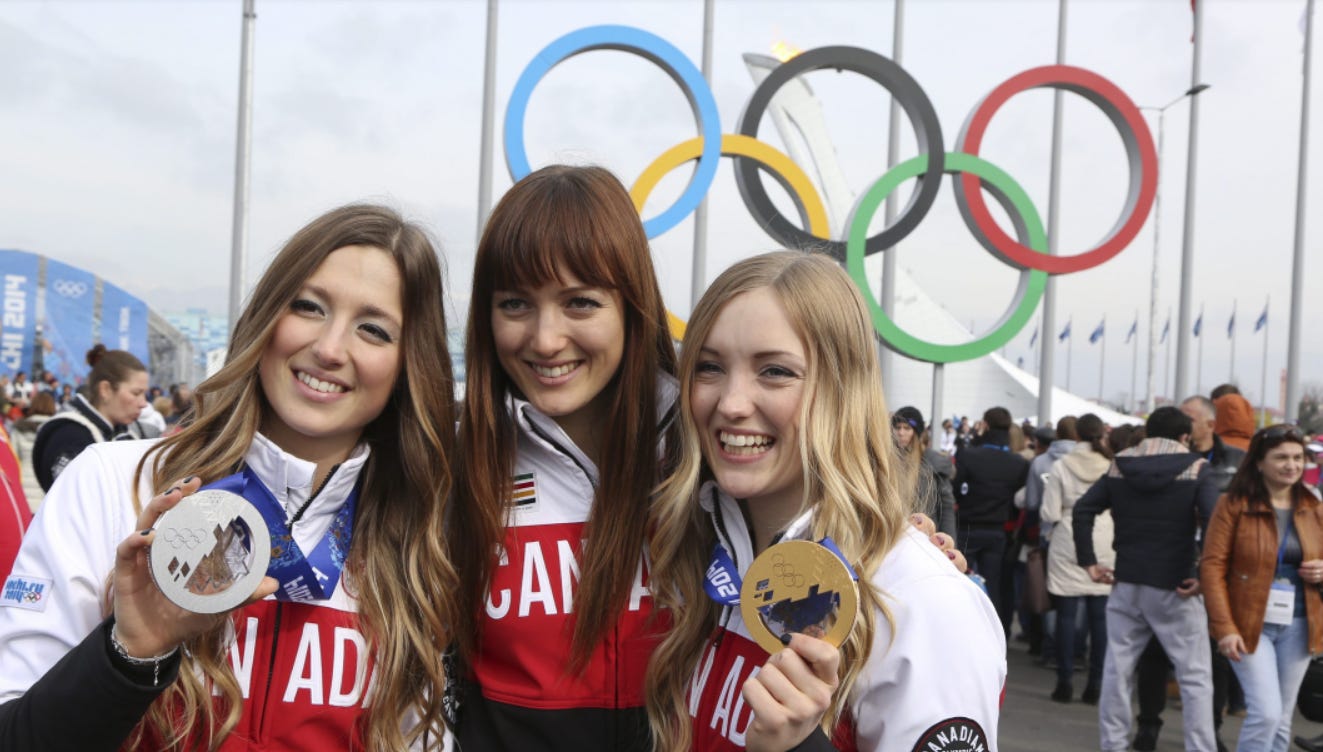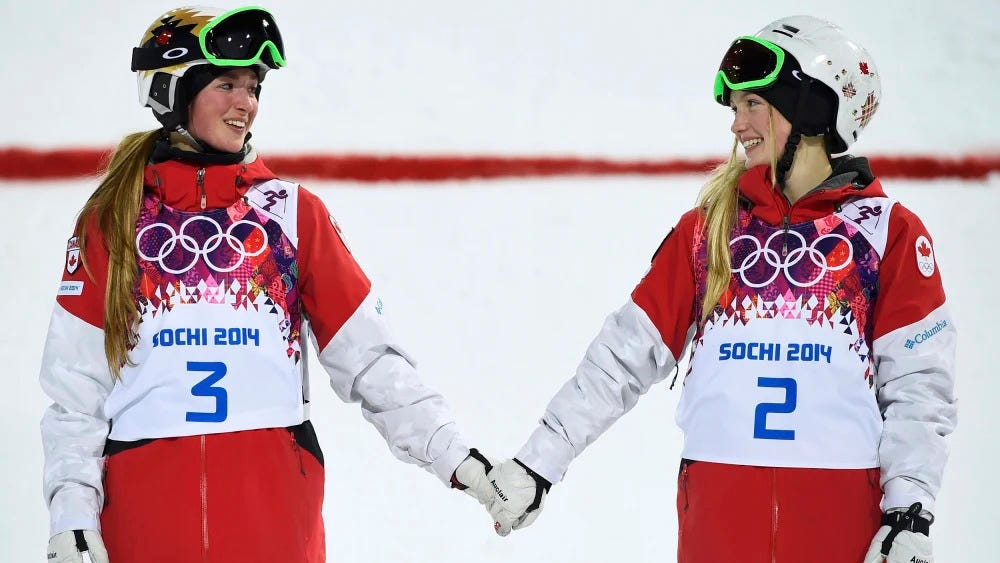Olympic Rewind: Canada at the Sochi 2014 Winter Olympics
Canada won 25 medals ten years ago in Russia.
Welcome back to Olympic Rewind, a series here at True North where we look back at past editions of the Olympic Games, highlighting the top Canadian athletes and stories.
In this edition we’re going back ten years to the Sochi 2014 Winter Olympics. With the 2026 Winter Olympics about 16 months away, and it being a decade since Sochi 2014, it feels like a good time to revisit what was a very successful Games for Team Canada.
RELATED: Looking back at the Paris 1924 Summer Olympics // Looking back at the Tokyo 1964 Summer Olympics
Sochi 2014 came just four years after Canada hosted an incredibly successful Winter Olympics in Vancouver — which to this day is still seen as one of the best ever, and a transformative event for sports in this country.
The 2014 Games were Canada’s second-best at the time in terms of total medals, winning 25 after picking up 26 in Vancouver. Since then Canada won 26 again at Beijing 2022, and a national record 29 at Pyeongchang 2018.
We may revisit those Olympics as well at some point, but for now let’s take a trip back ten years to Sochi 2014.
Highlights:
Canadian athletes: 222
Opening ceremony flag bearer: Hayley Wickenheiser (Ice Hockey)
Closing ceremony flag bearers: Kaillie Humphries and Heather Moyse (Bobsleigh)
Medal tally: 25 (ten gold, ten silver, five bronze)
Place on medal table: Third
Medallists:
Gold:
In the last time Olympic hockey featured NHL players (before their return in 2026), the Canadian team dominated its way to the gold medal in the men’s event. Canada only allowed three goals in an undefeated tournament as they defended their title, beating Sweden 3-0 in the gold medal game.
Canada swept both hockey golds, with the women’s team winning a fourth-consecutive gold medal. After winning all three group games, Canada beat Switzerland in the semifinals and the United States in the final, taking the gold with an overtime winner from the great Marie-Philip Poulin.
RELATED: Canada's Sochi 2014 men’s hockey roster: Where are they now?
Canada also swept both curling gold medals in Sochi, winning the men’s event for the third Olympics in a row.
Represented by skip Jennifer Jones, Kaitlyn Lawes, Jill Officer, Dawn McEwen, and Kirsten Wall, Canada dominated the women’s tournament — becoming the first women's team to go through an Olympic tournament undefeated. After winning all nine round robin games, Canada beat Great Britain in the semifinals and Sweden in the gold medal game to fly to the top of the podium.
The men’s team — made up of skip Brad Jacobs alongside Ryan Fry, E. J. Harnden, Ryan Harnden, and Caleb Flaxey — won seven of nine round robin games, moving on to the playoffs, where they beat China in the semifinals and Great Britain in the gold medal match.

After winning his first two Olympic gold medals in Vancouver, short track speed skater Charles Hamelin added a third in Sochi four years later, taking gold in the men's 1500 metre event. Hamelin later became Canada’s most decorated male Winter Olympian, adding hardware in 2018 and 2022 before retiring with six Olympic medals in his collection — four gold, one silver, one bronze.
Repeating their gold medal in the two-woman bobsleigh competition were Canadian pair Kaillie Humphries and Heather Moyse, the first duo to do so at the Olympics. They finished with a combined time of 3:50.61 across the four runs, just one tenth of a second ahead of the silver medal-winning Americans. Humphries also won a bronze medal in the event at the 2018 Olympics alongside Phylicia George, before she switched to representing the United States where she has had further international success in both the two-woman and monobob events.

Canada’s most successful sport at Sochi 2014 was freestyle skiing, where the nation brought home nine medals, four of them gold.
Four years after becoming the first Canadian ever to win an Olympic gold on home soil, Alexandre Bilodeau repeated as the men’s moguls champion in Sochi, putting up a big score on the final run to overtake fellow Canadian Mikaël Kingsbury. In doing so he became the first freestyle skier in any discipline to win two Olympic gold medals, and the first Canadian man to defend an individual Olympic title.
In the women’s moguls, Justine Dufour-Lapointe won Canada’s first gold medal of the Games, picking up 22.44 points in the final, one spot over her sister Chloé’s score of 21.66. A third Dufour-Lapointe sister, Maxime, finished 12th in the event as they became the first three sisters in Olympics history to compete in the same event. Justine, 19 at the time, set the record for the youngest freestyle skiing Olympic champion ever. More on the Dufour-Lapointe family in a bit.
The women's ski cross event in Sochi was won by Marielle Thompson, who after finishing third in the seeding portion of the competition went on to win all of her remaining races, including the Big Final, en route to the gold medal, just ahead of fellow Canadian Kelsey Serwa.
In the women’s slopestyle event, Dara Howell took the gold medal with a best run of 94.20 points in the final, leading an all-North American podium that also included Canadian Kim Lamarre in third.

Silver:
Several of the silver medal-winning freestyle skiers are mentioned above, but to recap: Mikaël Kingsbury won his first Olympic medal in men’s moguls, finishing second to Alexandre Bilodeau before taking gold four years later, and Chloé Dufour-Lapointe finished second to her sister Justine in women’s moguls. Four years before winning the gold medal in women’s ski cross, Kelsey Serwa took silver in Sochi behind teammate Marielle Thompson.
Mike Riddle also won a medal in freestyle skiing, taking silver in the men’s halfpipe event. Riddle had a top score of 90.60 points on his second run in the final, finishing second behind American David Wise.
Also on the snow, Dominique Maltais finished second in the women’s snowboard cross event, improving on her bronze medal in the same event from the 2006 Games. Maëlle Ricker, who won gold for Canada in Vancouver, was unable to finish her quarterfinal and defend her crown.

Figure skating was also a successful sport for Canada in Sochi, with athletes picking up three silver medals.
After winning the hearts of the nation with a gold medal in Vancouver, legendary ice dancing pair Tessa Virtue and Scott Moir settled for silver in Sochi before climbing back to the top of the podium in Pyeongchang. American duo Meryl Davis and Charlie White took the gold in Sochi, setting new records in the short dance and free dance, and as a result a new record in the overall score.
Entering the Games, Patrick Chan held the world record for the free skate portion of men’s singles figure skating, as well as the record for highest total score. He put up another strong total score of 275.62 in the final of the men’s singles competition, but narrowly missed out on the gold medal, losing to Japan’s Yuzuru Hanyu. Hanyu set a new short program record, the first skater to get over 100 points in that portion of the competition, and beat Chan to gold by four-and-a-half points.
Virtue, Moir and Chan also played key roles in Canada finishing second in the team event. The team — which also included Kevin Reynolds, Kaetlyn Osmond, Meagan Duhamel, Eric Radford, Kirsten Moore-Towers, and Dylan Moscovitch — finished behind the hosts Russia and ahead of the United States, who took bronze.
Canada also won a pair of silver medals in speed skating. The first one came in the men's 1000 metre event, where Canada’s Denny Morrison finished second in a time of 1:08.43, just four hundredths of a second off the gold medal.
The other silver medal came in short track speed skating, where Canada finished second in the women’s 3000 metre relay. Marie-Ève Drolet, Jessica Hewitt, Valérie Maltais, and Marianne St-Gelais finished in a time of 4:10.641, just over a second behind the team from South Korea.
Bronze:
A few days after winning a silver medal in the 1000m speed skating event, Denny Morrison added a bronze medal in the 1500m, the final Olympic medal of his decorated career. In short track, Charle Cournoyer, the youngest member of Team Canada in that sport at Sochi 2014, took the bronze medal in the men’s 500m.
Sochi 2014 was the start of a bronze medal streak for snowboarder Mark McMorris. He finished third in the men’s slopestyle event, a result he has since matched at Pyeongchang 2018 and Beijing 2022, while consistently being considered a top threat for gold. Also in slopestyle, but in the women’s skiing event, Kim Lamarre took bronze, finishing with a top score of 84.00 points, less than half a point back of the silver medal and 9.20 points back of compatriot Dara Howell for the gold.
Jan Hudec won Canada’s lone alpine skiing medal of Sochi 2014, a bronze in the men’s super-G competition. He finished in a time of 1:18.67, tying American racer Bode Miller and sharing third place, 0.53 seconds back of the gold medal.

The Dufour-Lapointe Sisters — Together Through It All
When they hit the slopes in Sochi, Maxime, Justine and Chloé Dufour-Lapointe became just the third trio of sisters to ever compete in the same individual event at the Winter Olympics.
Ranked among the best moguls skiers in the world heading into the Games, all three competed in the same qualifying group, and all advanced to the final. They advanced to the second run of the final as well, where 20 athletes were trimmed to 12. Maxime finished twelfth, finishing last on the second run, but Justine and Chloé moved onto the final run to give themselves a shot at the podium.
Justine scored 22.44 points on the final run to take the gold medal, while Chloé scored 21.66 for the silver medal, part of an all-North American podium with Hannah Kearney (21.49 points) of the United States. The two Canadian sisters held hands as they stepped onto the podium, Justine as the new Olympic champion.
“Holding Chloé's hand meant that I wasn't alone,” she said afterwards. “I was in shock. I saw Chloé and I felt calm. Holding her hand, I knew it would feel more like home.”

The three sisters combined to sweep the podium at a World Cup event in their home province of Quebec in 2016. Maxime’s international career came to an end in 2018 after the lone Olympic appearance in 2014, while Chloé retired after Beijing 2022, becoming the first female Canadian freestyle skier to compete at four Olympics in the process.
Justine later won a silver medal at Pyeongchang 2018 and also went to the 2022 Games. She no longer competes in moguls, but now competes in freeriding on the Freeride World Tour, where she was the 2023 world champion and Rookie of the Year.
In Beijing, after Justine crashed on the first run of the final, she was comforted by Chloé in an incredibly emotional moment that is one of the lasting Team Canada memories from those Olympics.
From the highest of highs to disappointing lows, the sisters have been together through it all.
Thank you for reading this post on True North. To be the first person to read future posts, and listen to new podcast episodes, subscribe for free using the button below, or share the article with someone you know.



